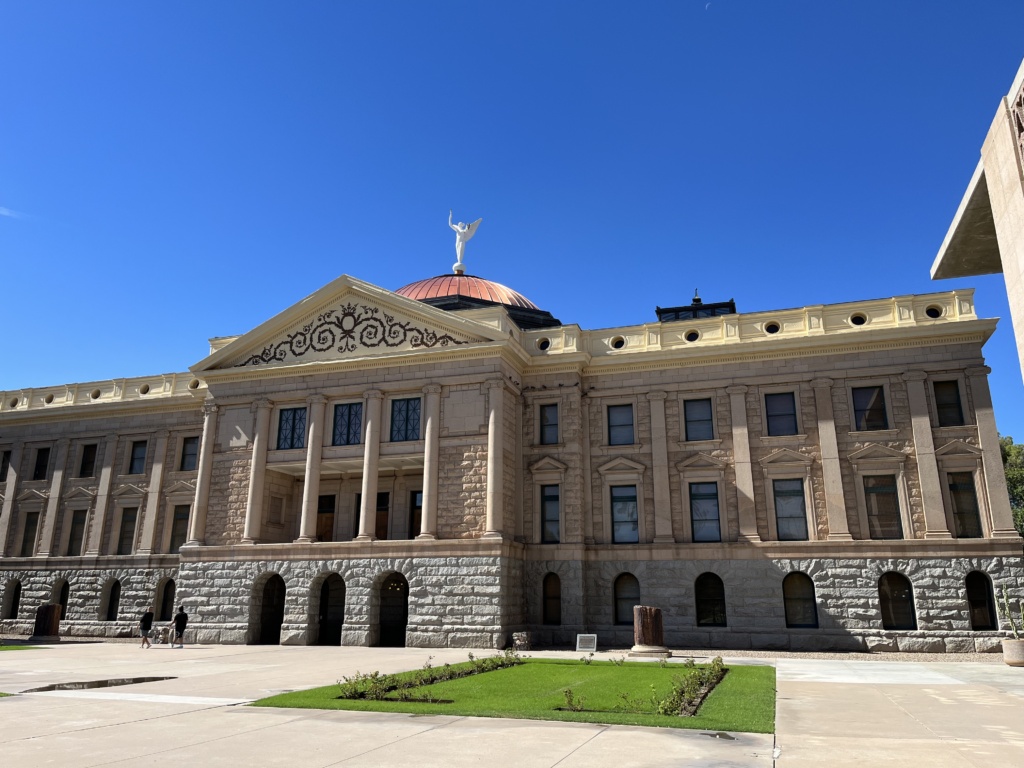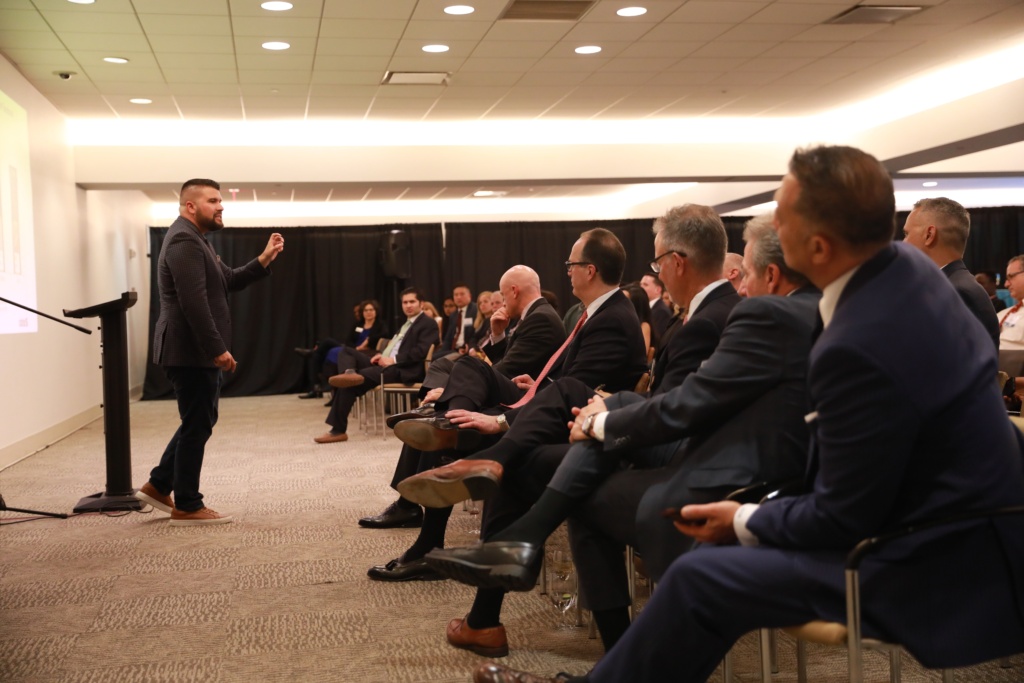Training Critical Thinkers to Strengthen Our Democracy

The Freedom Center partners with the UArizona James E. Rogers College of Law to offer a Master of Legal Studies in Law & Economics (MLS-L&E) degree. The online program provides an enhanced understanding of the legal, political, and legislative processes and how they collectively impact individuals and society. Scholarships are available for qualified students (see below).
Who it’s for:
- Undergraduate students who want to pursue a postgraduate degree
- High school government, economics, and social studies teachers
- Elected officials and public sector professionals
- Private sector professionals who interact with the government or regulatory process
Freedom Center Ambassadors:
We can connect you with MLS-L&E graduates who can share their experience and provide more information detailing how the degree has strengthened their career.
Questions?
Contact Freedom Center Manager of Special Programs Kerry Montaño to learn more.

What You’ll Learn
A University of Arizona post-graduate degree provides a solid professional foundation. Working professionals and students enrolled in the MLS, L&E program will learn the following:
- General and specialized knowledge of economic theory and empirical economic methods.
- Application of basic economic concepts and empirical tools to assess legal and political issues.
- Familiarity with concrete applications of law and economics methods across private and public law fields.
- Expertise that builds on economics, political theory, and philosophy to explore and analyze key normative concepts such as rationality, efficiency, justice, welfare, and virtue.
- Through real-world case studies, with issues like property rights and torts and contracts, and the American common law system, court cases can become laws.
Concentration Courses
Law & Economics
The law affects every aspect of human behavior, both in the private and public sphere. For this reason, the study of law is by its nature interdisciplinary: the understanding of legal problems almost always requires to cross boundaries and think across a vast range of social science fields. Economics is perhaps the most important among these fields. Whether the subject is a country’s social and political structure, contracts or torts, the functioning of free markets or corporations, the combined knowledge of law and economics is vital for a full assessment of the underlying problems. It is thus unsurprising that the application of the economic method to the study of law and the legal process has increasingly grown into an established interdisciplinary field. Nowadays, economic theory is used in almost all areas of law to assess legal issues from a normative perspective. At the same time, there is a growing recourse to empirical economics as a method to evaluate the positive impact of existing legal rules.The aim of this course is threefold. First, it aims at providing students with the methodology and tools – both theoretical and empirical – of law and economics to better understand legal institutions. This methodological part will empower students with the ability to develop a functional analysis of institutions aimed at addressing relevant policy issues. Second, the course will expose the students to concrete applications of the law and economics method across several private law fields, including property, torts and contracts. Third, the course will pay special attention to the law and economics of corporate law, focusing, in particular, on issues such as shareholder and stakeholder conflicts, executive compensation and corporate social responsibility.
The Ethical Entrepreneur
The Ethical Entrepreneur studies commercial society from the perspectives of philosophy, economics, business, and law. We start from a simple premise that Ethics concerns how to live in such a way that your community is better off with you than without you, coupled with a simple premise that whatever the conflict is between moral and economic success, such conflict is not a matter of necessity. The central questions that will explore in this course include: (i) Why do some societies grow rich while others remain poor? (ii) What constitutes a good life and how can one achieve? (iii) What role do entrepreneurs play in a commercial society? (iv) How can I prepare to succeed in commercial society?
Political Economy, Law, and Experimentation
Experimental Economics is a field that began with the proposition that economic theory can be testable in a controlled laboratory setting. Experimental work has been conducted in all fields of economics including Industrial Organization, Game Theory, Public Finance, General Equilibrium Theory and even Macroeconomics. Students will be introduced to the methods of experimental science, explore major subject areas that have been addressed through laboratory experiments, and learn of some of the major personalities at the intersection of economics, politics, and philosophy and law. Topics included reflect the current split in the field: behavioral economics is more closely linked to psychology, while the main branch, experimental economics, tries to learn about individual and group behavior given economic institutions and questions. Both, however, are used to examine creative policy and legal solutions to societal problems. Most importantly, this course has many carefully selected “hands-on” simulations of markets and interactions. Those experiences are conducted online, synchronously and asynchronously. Many simulations are exactly the same experiments used in research. Typically, students will participate in the simulation, observe their own behavior and the behavior of others, read the underlying theory, and discuss the results.
Ethics and Economics of Environmental Policy
This course revolves around two clusters of questions. 1st, there are philosophical questions about the nature of value: what sorts of things have rights, what has value, what kinds of values there are, whether value presupposes the existence of valuers, and whether there are objective as well as subjective values. 2nd, there are practical questions about what kinds of social and legal arrangements are actually conducive to preserving and promoting of environmental values. The first part of the course emphasizes the theoretical cluster while the second emphasizes the practical cluster, but the difference will be a matter of degree, since in theory and in practice it is hard (and probably unwise) to treat the two clusters as entirely separate. Cases around which discussions will be organized may include ongoing litigation in the Deepwater Horizon case, Massachusetts v. EPA, Aguinda v. Chevron Texaco, Spur v. Del Webb, Euclid v. Ambler, Ghen v. Rich, Keeble v. Hickeringill, etc.
Law, Economics, and Civic Society
This course introduces students to the study of law and law’s relation to politics and economics in both theoretical and practical terms. We will begin with a discussion on the nature of law, economics and politics, and proceed to investigate how different interpretations of these three terms lead to remarkably different conclusions regarding the proper relationship between and among them. We will begin by asking “What is law?” This will be followed by “What is economics? and “What is politics?” Is law divinely ordained? Is it a human invention? What is the role of reason in the realm of law? We will ask similar questions regarding the nature of both economics and politics. Ultimately we will try to situate a complex understanding of both law, economics and politics into the larger framework of American social and political life.
Legislative Process for State and Local Legislators and Staffers
This course will teach you the ins and outs of negotiation and law- and policy-making, and how they are both used on the legislative level. We will cover a variety of issues and topics vital for success of legislators, board members, council members and their staff, and you will hear directly from policymakers, department staffers and advocacy groups and lobbyists that have had an impact on policy. The content will provide a foundation on the key parties at the table, how politics and bipartisanship is important and what are the best ways to foster and maintain relationships. You will learn more about the complex politics of law-making and policy. Regardless of experience or training, you will have the opportunity to learn about policy issues and how they can be navigated in a bipartisan way, and how you can navigate the system by working productively with those with whom you disagree while not compromising your values in politics and policy.
Required Core Courses
Procedure
This course explores the legal process and procedures followed in our systems of civil and criminal justice. Topics will include the components of due process, adversarial legalism and the roles of attorneys, judges, prosecutors, and professional ethics, and the core elements of civil and criminal systems.
American Common Law System I: Torts and Contracts
The American Common Law System I is one of two courses which conveys what is distinctive about the common law approach as a legal methodology and as a reflection and commentary on the history and politics of the American experience, from the early colonial period to the 21st century world of globalized commerce, human rights concerns and environmental and social justice. The course examines the history and sources of the common law, common law modes of legal rhetoric, argument, and communication skills and transformation and adaptation of the common law achieved through social justice and law reform movements. The weekly discussion sections will focus on the development of legal writing, research and critical reasoning skills necessary to solve legal problems, particularly in the context of predictive written communications to various audiences. The American Common Law System I course will focus primarily on Contract Law and Tort Law in the American legal system.
American Common Law System II: Property
The American Common Law System II is one of two courses which conveys what is distinctive about the common law approach as a legal methodology and as a reflection and commentary on the history and politics of the American experience, from the early colonial period to the 21st century world of globalized commerce, human rights concerns and environmental and social justice. The course examines the history and sources of the common law, common law modes of legal rhetoric, argument, and communication skills and transformation and adaptation of the common law achieved through social justice and law reform movements. The weekly discussion sections will focus on the development of legal writing, research and critical reasoning skills necessary to solve legal problems, particularly in the context of predictive written communications to various audiences. The American Common Law System II course will focus primarily on Property Law and its intersections with Torts and Contract Law in the contemporary American legal system.
American Public Law System: Constitutional Law
The American Common Law System II is one of two courses which conveys what is distinctive about the common law approach as a legal methodology and as a reflection and commentary on the history and politics of the American experience, from the early colonial period to the 21st century world of globalized commerce, human rights concerns and environmental and social justice. The course examines the history and sources of the common law, common law modes of legal rhetoric, argument, and communication skills and transformation and adaptation of the common law achieved through social justice and law reform movements. The weekly discussion sections will focus on the development of legal writing, research and critical reasoning skills necessary to solve legal problems, particularly in the context of predictive written communications to various audiences. The American Common Law System II course will focus primarily on Property Law and its intersections with Torts and Contract Law in the contemporary American legal system.
Legal Analysis, Writing, and Research
This course will teach Masters of Legal Studies students how to find legal authorities relevant to legal problems; how to analyze a legal issue using facts and law; and how to communicate legal analysis logically and concisely. This course consists of research exercises; writing exercises, including letters and legal memoranda; and more complex research and writing assignments. Students will work in groups and individually to learn the fundamentals of good writing and editing skills.

Faculty

The MLS Law & Economics concentration courses are designed and taught by Freedom Center faculty and visitors including David Schmidtz, Allen Buchanan, Thomas Christiano, Saura Masconale, Simone Sepe and more.

